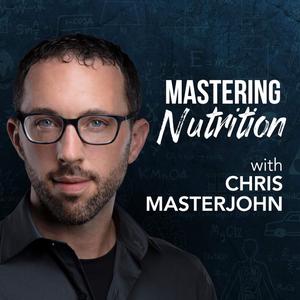
Mastering Nutrition
Chris Masterjohn, PhD
- 1 hour 34 minutesHow Lactate Alkalinizes Your Muscles
For a long time, most people believed that when we exercise, our muscles make lactic acid, this acidifies the muscles, and the acidity contributes to contractile failure, fatigue, and delayed-onset muscle soreness. Some people still believe this.
You may have heard the argument against it from well-known figures like Andy Galpin, or, if you’re deep into the science, you may have read the work of George Brooks.
In this lesson, we are going to cover the biochemistry of lactate production. We will see that we never make lactic acid, ever. We make lactate. Making lactate is fundamentally alkalinizing.
We will take a look at the presentation of glycolysis in the Berg and Lehninger biochemistry textbooks to see that, on the one hand, they give us everything we need to know to understand that the human body never makes lactic acid, but, on the other hand, they really do not equip us well to understand where acidity does comes from during exercise. This is because they do not consider acid-base balance important enough to completely present the proton balances of the chemical reactions.
Finally, we will cover what does cause muscular fatigue, take a look at the research on lactate supplements, and come to some conclusions about the best way to manage acidity during exercise to maximize performance.
This is part of a larger course on the biochemistry of how we derive energy from food and use it to fuel our wellness, performance, and longevity. Take the full course here:
https://chrismasterjohnphd.substack.com/p/masterclass-with-masterjohn-energy
To see the slides, watch this lesson on youtube:
https://www.youtube.com/watch?v=IrpbLllsSHQ
To obtain the written version with timestamped slides for better studying, see here:
https://chrismasterjohnphd.substack.com/p/how-lactate-alkalinizes-your-muscles
This lesson is free for one week. After that it will be reserved for Masterpass members. You can learn more about the Masterpass here:
https://chrismasterjohnphd.substack.com/about
You can subscribe to the Masterpass here:
https://chrismasterjohnphd.substack.com/subscribe
2:52 How textbooks present glycolysis
3:36 What is acidity?
4:32 The acidfying and alkalinizing phases of glycolysis
7:09 Glycolysis: A brief review
10:08 The Principles
29:33 The Reactions -- and Where the Textbooks Go Wrong
38:59 Human beings do not make lactic acid
42:13 Lactate transport is even more alkalinizing to muscle
47:44 Robert Robergs Fights an Uphill Battle in Clarifying the Sources of Acidity and the Alkalinizing Effect of Lactate
1:01:08 What causes fatigue?
1:05:15 Does CO2 contribute to acidity?
1:13:45 Where is Glycolysis Getting Backed Up?
1:23:10 Conclusiuons: What's realy going on with exercise-induced acidosis.
1:26:34 Lactate supplements
1:30:53 How to use this information in training for optimal performance.
6 September 2024, 2:07 pm - 1 hour 30 minutesD-Lactate: Groundbreaking Research No One Is Talking About
D-lactate is commonly stated to be exclusively a microbial metabolite.
This is found in assumptions within the medical literature for decades even when it was long-known to be false.
While D-lactate is indeed made by bacteria, D-lactate is also inarguably and irrefutably produced by human enzymes.
In this podcast, moreover, I will argue the following:
Microbial contribution to D-lactate in humans under normal circumstances is negligible.
I coin the term “the D-lactate shuttle” to describe a role for D-lactate that should eventually make its way into biochemistry textbooks alongside the malate-aspartate shuttle and the glycerol phosphate shuttle.
The D-lactate shuttle operates alongside these other shuttles to balance the priorities of conserving cytosolic NAD+, reducing cytosolic acidity, bypassing complex I, or generating ATP. It is uniquely useful as a shuttle when there is an absolute deficit of niacin or NAD(H).
D-lactate is an important contributor to gluconeogenesis that could account for up to 11% of it and rival an individual amino acid.
While D-lactate concentrations in human plasma are infinitesimal, when the downstream metabolism of D-lactate and L-lactate are blocked by genetic disorders, the concentrations of the two forms are similar in plasma. This contrasts wildly with the common claim that flux through D-lactate is “minuscule.” Most likely D-lactate is produced in considerable quantities in liver and kidney but is rarely secreted into plasma because doing so would risk neurotoxicity.
D-lactate should be taken seriously for its potential role in Parkinson’s and in neurological problems generally, for its role in diabetes, and for its extremely underappreciated roles in glycolysis, gluconeogenesis, and the respiratory chain.
Oxalate powerfully impairs D-lactate clearance, so D-lactate should be investigated as a potential link between oxalate and autism, and oxalate-lowering strategies should be seen as a way to improve D-lactate clearance and reduce its potential role in diabetes and neurological disorders.
See the sections on riboflavin, zinc manganese, and glutathione in Testing Nutritional Status: The Ultimate Cheat Sheet, as well as Does CoQ10 Deserve a Spot on Your Longevity Plan? and the How to Detox Manganese guide for managing the relevant nutrients.
Read the written version for live links and references: https://chrismasterjohnphd.substack.com/p/d-lactate-groundbreaking-research
31 July 2024, 9:28 pm - 2 minutes 2 secondsHandling Creatine Side Effects
In this podcast we cover elevated creatinine, insomnia, cramps constipation, water retention, hair loss, irritation and anger, lightheadedness during lifting, bloating, aggravation of restless leg syndrome, irritation of asthma, bloody noses, anxiety, headaches, heart palpitations, twitching, and fast or slow heartbeat.
The full podcast and article can be found here: https://chrismasterjohnphd.substack.com/p/handling-creatine-side-effects12 July 2024, 7:07 pm - 28 minutes 47 secondsYour Cells Are Starving For Creatine
Creatine is like your second mitochondria. Or, the mitochondria’s chief of staff. Or its co-pilot.
Your mitochondria make ATP so you can see clearly, hear accurately, digest your food, power your brain, show off your your shiny skin, lift heavy things, and perform your best at the challenges you face. They do that all with the help of creatine.
Creatine is responsible for spreading the impact of mitochondrial ATP production into the general area of the cell known as the cytosol, and into every organelle outside the mitochondria.
While it is more important in cells with high ATP requirements, variable ATP requirements, and long distances between mitochondria and the source of ATP utilization, it is still incredibly important in every cell.
There is no point in optimizing your mitochondria if you don’t also optimize your creatine.
Many people may believe that the high muscle creatine stores that athletes achieve with creatine supplements are “unnatural” and something not achievable until creatine supplements were available.
Here, I argue that nothing could be further from the truth. Every muscle fiber wants to be exactly as rich in creatine as achieved with creatine supplementation.
All of your cells want to be rich in creatine. Your brain is dying to be this rich in creatine. Your muscles are starving to be this rich in creatine.
It is completely natural to be this rich in creatine, yet most of us in the modern era who don’t supplement just aren’t that optimized.
The creatine we require to be optimized is likely etched deep into our beings by our ancestral consumption of one to two pounds of meat per day. When red and rare, one pound can give the dose that saturates tissue stores. When white and well done, two pounds may be required.
But can we synthesize enough creatine ourselves when all the precursors in place?
Here we examine that question.
But first, a brief review of creatine’s lesser known benefits.
This is educational in nature and not medical or dietetic advice.
The article version has live links, graphs, and references:
https://chrismasterjohnphd.substack.com/p/your-cells-are-starving-for-creatine
Handling Creatine Side Effects will be released as a podcast tomorrow but is available as a written article right now:
https://chrismasterjohnphd.substack.com/p/handling-creatine-side-effects
12 July 2024, 12:54 am - 23 minutes 16 secondsIs Whole Food Vitamin C Really Different? | Masterjohn Q&A Files #330
Question: Is whole food vitamin C superior to natural because it is part of a tyrosinase complex?
Short Answer: Vitamin C is nearly ubiquitously distributed in plant tissues, and is never bound to any enzyme as a structural complex. Vitamin C promotes absorption of iron from plant foods, inhibits copper absorption, and de-loads copper from ceruloplasmin, which may play a role in distributing copper to tissues. Vitamin C is not capable of destroying ceruloplasmin. These functions follow directly from vitamin C as an electron donor and there is no evidence whatsoever that whole food vitamin C behaves differently in these respects than synthetic vitamin C. However, daily needs in most contexts are 2-400 milligrams of vitamin C per day, which is below the dose shown to potentially cause problems with copper. Getting this from whole foods or whole food supplements is better than using synthetic vitamin C because it avoids GMO corn and Chinese synthetics and provides a host of other beneficial constituents alongside the vitamin C.
This is a clip from a live Q&A session open to CMJ Masterpass members. In addition to this episode, you can access two other free samples using this link:
https://chrismasterjohnphd.substack.com/p/questions-on-hair-trace-mineral-analysis
In that batch of free episodes you will also find the answer to this question:
-
Is Hair Mineral Testing Useful?
-
What's the Deal With Seed Oils?
If you want to become a Masterpass member so you can participate in the next live Q&A, or so you can have access to the complete recording and transcript of each Q&A session, you can save 10% off the subscription price for as long as you remain a member by using this link to sign up:
https://chrismasterjohnphd.substack.com/qanda
Learn more about the Masterpass here:
https://chrismasterjohnphd.substack.com/about
This snippet is from the June 16, 2023 AMA. The full recording and transcript is reserved for Masterpass members. Here is a preview of what’s included:
-
Butyrate for Hashimoto’s? What else?
-
What in the comprehensive nutritional screening is helping to interpret lactate/pyruvate and ketone ratios?
-
Is the solution to a respiratory chain disorder to take Niagen?
-
If I have high manganese on an HTMA, do I need to detox?
-
Should CFS patients target reducing their serum BH4?
-
What to do about low alkaline phosphatase?
-
If my glucose spikes above 140, should I eat fiber and take ACV before the meal, eat cinnamon with the meal, chew slowly, and move for ten minutes after my meals?
-
Difficulty getting Quest to do the lactate/pyruvate ratio correctly.
-
Is 38 milligrams of niacinamide enough to rule out niacin deficiency as a cause of low NAD+?
-
How does optimizing body composition help optimize energy metabolism? Can impaired energy metabolism make someone fatter?
-
Is monounsaturated fat the best fat?
-
Manganese followup.
-
Do you need to stop taking biotin before a biotin test?
-
What in "a bunch of supplements" flip the lactate/pyruvate ratio from high to low?
-
NAD infusions, yay or nay?
-
Why do I feel better after a warm shower, even better than after sunshine?
-
Should I cut back on vitamin A if I have toxicity symptoms but cutting back makes me get sick?
-
Do home blood drop tests have to be pricked at the finger?
-
Is it true that my boyfriend was just born a night owl?
-
How much eating out is too much?
-
When measuring ketones, lactate, and glucose at home to optimize energy metabolism, what time of day should we take the measurements?
Here’s a link to the full AMA: https://chrismasterjohnphd.substack.com/p/recording-and-transcript-of-the-june-a55
Access the show notes, transcript, and comments here.
18 December 2023, 2:00 pm -
- 30 minutes 1 secondWhat's the Deal With Seed Oils? | Masterjohn Q&A Files #329
Question: What Is the Real Issue With Seed Oils? Short Answer: The main issue with seed oils is that they present an oxidative liability. They do not acutely cause oxidative stress, but their polyunsaturated fatty acids (PUFAs) are more vulnerable than any other macronutrient to oxidative damage. Oxidative stress can increase because of nutrient deficiencies, toxins, infections, other sources of inflammation, alcohol, or smoking, and it will inevitably increase as a function of aging. As oxidative stress increases, more PUFAs in the tissues mean more damage. At least 0.6 milligrams of vitamin E should be gotten per gram of PUFA in the diet, but vitamin E cannot fully protect against PUFA, so their intake should be moderated to the very low levels needed, as obtained by eating fatty fish once or twice a week, eating eggs daily, and eating 4-8 ounces of liver per week. Additional secondary problems with them include residual solvents and heat damage prior to intake, but the main issue is that we do not want to increase our tissue PUFA content more than needed.
This is a clip from a live Q&A session open to CMJ Masterpass members. In addition to this episode, you can access two other free samples using this link:
https://chrismasterjohnphd.substack.com/p/questions-on-hair-trace-mineral-analysis
In that batch of free episodes you will also find the answer to this question:
-
Is Hair Mineral Testing Useful?
-
Is Whole Food Vitamin C Really Different?
If you want to become a Masterpass member so you can participate in the next live Q&A, or so you can have access to the complete recording and transcript of each Q&A session, you can save 10% off the subscription price for as long as you remain a member by using this link to sign up:
https://chrismasterjohnphd.substack.com/qanda
Learn more about the Masterpass here:
https://chrismasterjohnphd.substack.com/about
This snippet is from the June 16, 2023 AMA. The full recording and transcript is reserved for Masterpass members. Here is a preview of what’s included:
-
Butyrate for Hashimoto’s? What else?
-
What in the comprehensive nutritional screening is helping to interpret lactate/pyruvate and ketone ratios?
-
Is the solution to a respiratory chain disorder to take Niagen?
-
If I have high manganese on an HTMA, do I need to detox?
-
Should CFS patients target reducing their serum BH4?
-
What to do about low alkaline phosphatase?
-
If my glucose spikes above 140, should I eat fiber and take ACV before the meal, eat cinnamon with the meal, chew slowly, and move for ten minutes after my meals?
-
Difficulty getting Quest to do the lactate/pyruvate ratio correctly.
-
Is 38 milligrams of niacinamide enough to rule out niacin deficiency as a cause of low NAD+?
-
How does optimizing body composition help optimize energy metabolism? Can impaired energy metabolism make someone fatter?
-
Is monounsaturated fat the best fat?
-
Manganese followup.
-
Do you need to stop taking biotin before a biotin test?
-
What in "a bunch of supplements" flip the lactate/pyruvate ratio from high to low?
-
NAD infusions, yay or nay?
-
Why do I feel better after a warm shower, even better than after sunshine?
-
Should I cut back on vitamin A if I have toxicity symptoms but cutting back makes me get sick?
-
Do home blood drop tests have to be pricked at the finger?
-
Is it true that my boyfriend was just born a night owl?
-
How much eating out is too much?
-
When measuring ketones, lactate, and glucose at home to optimize energy metabolism, what time of day should we take the measurements?
Here’s a link to the full AMA: https://chrismasterjohnphd.substack.com/p/recording-and-transcript-of-the-june-a55
Access the show notes, transcript, and comments here.
4 December 2023, 2:00 pm -
- 24 minutes 15 secondsIs Hair Mineral Testing Useful? | Masterjohn Q&A Files #328
Question: How useful is hair trace mineral analysis (HTMA) for nutritional testing?
Short Answer: Hair trace mineral analysis is included as an optional add-on in the comprehensive nutritional screening from Testing Nutritional Status: The Ultimate Cheat Sheet, because it can capture data for some ultra-trace minerals for which there are no better-validated tests, and it might capture a pattern that might not be picked up as quickly with blood work, such as a mineral transport issue. However, its utility is limited by the fact that hair mineral content is not well validated as a test for any specific mineral, is generally anti-validated when there is enough science on a mineral (such as zinc, where hair zinc does not go down in deficiency), and should not be used as a central piece of data without corroboration from other more well-validated tests, which exist for most of the nutrients.
This is a clip from a live Q&A session open to CMJ Masterpass members. In addition to this episode, you can access two other free samples using this link:
https://chrismasterjohnphd.substack.com/p/questions-on-hair-trace-mineral-analysis
In that batch of free episodes you will also find the answer to this question:
-
What's the Deal With Seed Oils?
-
Is Whole Food Vitamin C Really Different?
If you want to become a Masterpass member so you can participate in the next live Q&A, or so you can have access to the complete recording and transcript of each Q&A session, you can save 10% off the subscription price for as long as you remain a member by using this link to sign up:
https://chrismasterjohnphd.substack.com/qanda
Learn more about the Masterpass here:
https://chrismasterjohnphd.substack.com/about
This snippet is from the June 16, 2023 AMA. The full recording and transcript is reserved for Masterpass members. Here is a preview of what’s included:
-
Butyrate for Hashimoto’s? What else?
-
What in the comprehensive nutritional screening is helping to interpret lactate/pyruvate and ketone ratios?
-
Is the solution to a respiratory chain disorder to take Niagen?
-
If I have high manganese on an HTMA, do I need to detox?
-
Should CFS patients target reducing their serum BH4?
-
What to do about low alkaline phosphatase?
-
If my glucose spikes above 140, should I eat fiber and take ACV before the meal, eat cinnamon with the meal, chew slowly, and move for ten minutes after my meals?
-
Difficulty getting Quest to do the lactate/pyruvate ratio correctly.
-
Is 38 milligrams of niacinamide enough to rule out niacin deficiency as a cause of low NAD+?
-
How does optimizing body composition help optimize energy metabolism? Can impaired energy metabolism make someone fatter?
-
Is monounsaturated fat the best fat?
-
Manganese followup.
-
Do you need to stop taking biotin before a biotin test?
-
What in "a bunch of supplements" flip the lactate/pyruvate ratio from high to low?
-
NAD infusions, yay or nay?
-
Why do I feel better after a warm shower, even better than after sunshine?
-
Should I cut back on vitamin A if I have toxicity symptoms but cutting back makes me get sick?
-
Do home blood drop tests have to be pricked at the finger?
-
Is it true that my boyfriend was just born a night owl?
-
How much eating out is too much?
-
When measuring ketones, lactate, and glucose at home to optimize energy metabolism, what time of day should we take the measurements?
Here’s a link to the full AMA: https://chrismasterjohnphd.substack.com/p/recording-and-transcript-of-the-june-a55 Access the show notes, transcript, and comments here.
20 November 2023, 2:00 pm -
- 51 minutes 10 secondsSecrets to Superior Cognitive Performance (Without Drugs)
Nutrition is far more powerful than drugs to improve cognitive performance.
We start by looking at cocaine, Adderall, and Ritalin, and show why these drugs cannot possibly hold a candle to nutrition.
Optimal nutrition can definitely optimize the function of dopamine, norepinephrine, acetylcholine, histamine, creatine, and the methylation system, and in doing so can simultaneously optimize focus, motivation, sustained attention, and mental flexibility, and methylation, all while eliminating anxiety, depression, and distraction.
Yet, popular nutritional cognitive stacks in the nootropic space do not have convincing evidence behind them, and this is probably a result of them trying to do too many things in one capsule.
This presentation covers the low-hanging fruit of nutrition for brain power, supplements that help, the importance of individual nutritional optimization, and the central power of finding one's genetic "health super-unlock."
For my simple protocol to optimize methylation, see here:
https://chrismasterjohnphd.substack.com/p/mthfr-protocol
For more detail on finding your own personal genetic health super-unlock, see here:
https://chrismasterjohnphd.substack.com/p/unlocking-performance-and-longevity
17 November 2023, 6:23 pm - 7 minutes 16 secondsVitamin C, Whole Food Vs. Synthetic: Does It Matter?
Debunking the myth that vitamin C in plants is found in a special "tyrosinase complex."
For the written article with references, see here: https://chrismasterjohnphd.substack.com/p/vitamin-c-whole-food-vs-synthetic
For issues of vitamin C dosing and balancing with other nutrients, see these two links:
https://chrismasterjohnphd.substack.com/p/the-powerful-duo-how-glutathione
https://chrismasterjohnphd.substack.com/p/balancing-vitamin-c-and-glutathione-d6f
16 November 2023, 6:39 pm - 6 minutes 3 secondsFact-Checking Gary Brecka on Rogan: A Deep Dive into MTHFR and Methylation
Watch or listen to the full critique here:
https://www.youtube.com/watch?v=kMPvCiOkEtQ
14 November 2023, 11:03 pm - 2 minutes 10 secondsCancer, IV Drips, and the Glutathione Vitamin C Connection
Is high-dose vitamin C good for you?
High-dose intravenous vitamin C can selectively kill cancer cells in live patients and can save sepsis patients from dying, but it acts as a pro-oxidant in cancer and an antioxidant in sepsis.
So what does it do in the rest of us?
Oral doses of 2000 milligrams raise oxalate levels in most people, and as little as 400 milligrams raises oxalate in some people.
This seems to be the most sensitive indicator of a delicate imbalance with glutathione and other factors needed to recycle vitamin C. Such a balance actually needs to be avoided when killing cancer yet is critical to maintaining health in every other context.
Given that vitamin C is important to immunity and general health, how do we take advantage of these benefits without upsetting the delicate balance with glutathione and the propensity to generate oxalate?
That is the topic of this podcast.
This podcast is a preview of a video only available to Masterpass members.
Get evergreen access to the video and podcast, as well as the written article with references, here:
https://chrismasterjohnphd.substack.com/p/balancing-vitamin-c-and-glutathione-d6f
6 November 2023, 7:01 pm - More Episodes? Get the App
Your feedback is valuable to us. Should you encounter any bugs, glitches, lack of functionality or other problems, please email us on [email protected] or join Moon.FM Telegram Group where you can talk directly to the dev team who are happy to answer any queries.
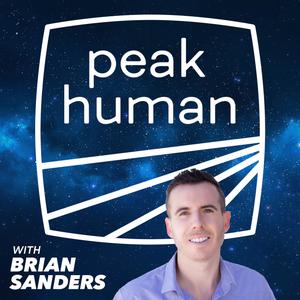 Peak Human - Unbiased Nutrition Info for Optimum Health, Fitness & Living
Peak Human - Unbiased Nutrition Info for Optimum Health, Fitness & Living
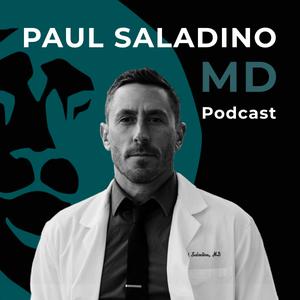 Paul Saladino MD podcast
Paul Saladino MD podcast
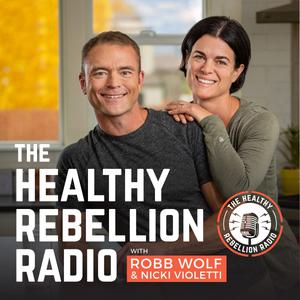 The Healthy Rebellion Radio
The Healthy Rebellion Radio
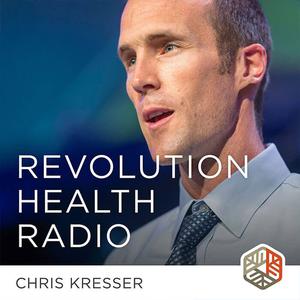 Revolution Health Radio
Revolution Health Radio
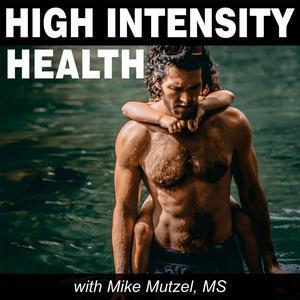 High Intensity Health with Mike Mutzel, MS
High Intensity Health with Mike Mutzel, MS
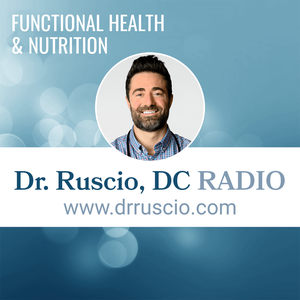 Dr. Ruscio Radio, DC: Health, Nutrition and Functional Healthcare
Dr. Ruscio Radio, DC: Health, Nutrition and Functional Healthcare